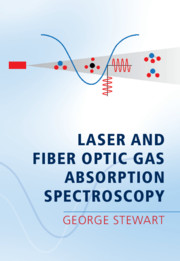Book contents
- Laser and Fiber Optic Gas Absorption Spectroscopy
- Laser and Fiber Optic Gas Absorption Spectroscopy
- Copyright page
- Dedication
- Contents
- Preface
- 1 Absorption Spectroscopy of Gases
- 2 DFB Lasers for Near-IR Spectroscopy
- 3 Wavelength Modulation Spectroscopy with DFB Lasers
- 4 Photoacoustic Spectroscopy with DFB Sources
- 5 Design and Application of DFB Laser Systems and Optical Fibre Networks for Near-IR Gas Spectroscopy
- 6 Principles of Fibre Amplifiers and Lasers for Near-IR Spectroscopy
- 7 Applications of Fibre Amplifiers and Lasers in Spectroscopy
- 8 Mid-IR Systems and the Future of Gas Absorption Spectroscopy
- Index
- References
5 - Design and Application of DFB Laser Systems and Optical Fibre Networks for Near-IR Gas Spectroscopy
Published online by Cambridge University Press: 07 April 2021
- Laser and Fiber Optic Gas Absorption Spectroscopy
- Laser and Fiber Optic Gas Absorption Spectroscopy
- Copyright page
- Dedication
- Contents
- Preface
- 1 Absorption Spectroscopy of Gases
- 2 DFB Lasers for Near-IR Spectroscopy
- 3 Wavelength Modulation Spectroscopy with DFB Lasers
- 4 Photoacoustic Spectroscopy with DFB Sources
- 5 Design and Application of DFB Laser Systems and Optical Fibre Networks for Near-IR Gas Spectroscopy
- 6 Principles of Fibre Amplifiers and Lasers for Near-IR Spectroscopy
- 7 Applications of Fibre Amplifiers and Lasers in Spectroscopy
- 8 Mid-IR Systems and the Future of Gas Absorption Spectroscopy
- Index
- References
Summary
The applications of near-IR spectroscopy with DFB lasers and fibre optic networks are reviewed. Since near-IR absorption lines are relatively weak, techniques to enhance the sensitivity are reviewed, including the use of multi-pass cells, ring-down spectroscopy and the various forms of cavity-enhanced spectroscopy. Examples of non-enhanced gas cellsconsidered include micro-optic cells for integration with optical fibre networks, evanescent-wave cells on silicon chips, and open-path free space propagation for atmospheric monitoring based on collection of scattered light or from a retro-reflector. The design of fibre optic sensor networks is discussed in detail particularly the use of spatial-division multiplexing for multi-point detection of gases over large areas. Throughout the chapter, a number of application areas are considered with examples given of near-IR systems employed for the detection of gas leaks from pipelines and storage facilities, characterisation of combustion processes, tomographic imaging of carbon dioxide in aero-engine exhaust emissions, imaging of hydrocarbons within internal combustion engines and atmospheric sensing of water vapour and greenhouse gases.
Keywords
- Type
- Chapter
- Information
- Laser and Fiber Optic Gas Absorption Spectroscopy , pp. 111 - 158Publisher: Cambridge University PressPrint publication year: 2021

